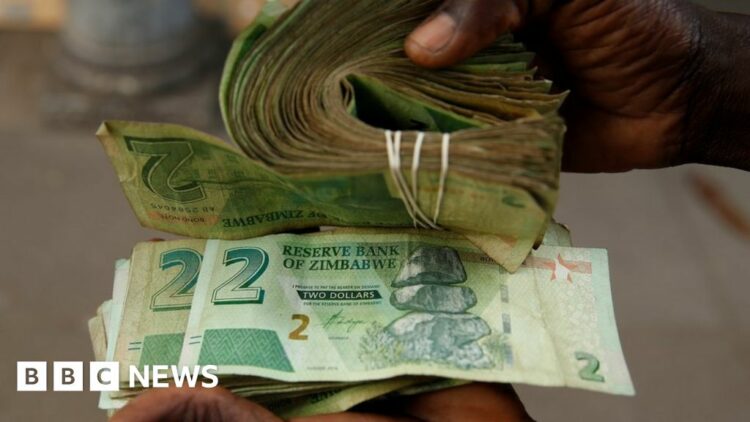20 November 2019
In our series of letters from African writers, journalist-turned-barrister Brian Hungwe says the need for cash has not been eased by the release of new Zimbabwean dollar notes over the last week.
In Zimbabwe, cash is king.
You need notes in your hand to avoid paying a premium for goods.
This has come about because of a chronic shortage of physical cash – which has led to a three-tier pricing model.
For example, if you go into a supermarket to buy a 15 Zimbabwean dollar loaf of bread, you can pay:
Z$15 in cashZ$18 in mobile moneyZ$20 by debit card.
You also need cash to pay for bus fares – electronic transactions are not accepted on public transport – and road-side vendors or some small grocery shops only take cash.
Image caption, Street vendors prefer notes or coins to electronic payments
A family of five with children of school-going age will need Z$250 a week for transport.
Extra weekly cash costs for bread, tomatoes and sugar could tot up to about another Z$150.
Yet banks have been rationing cash withdrawals to Z$300 a week – and ATMs have been empty.
Often people have been waiting fruitlessly in bank queues as there has not been enough money to give out.
Collusion
The cash crunch has led to a spike in inflation – it was running at 100% in June, when the local currency was officially reintroduced, and is now between 300% and 400%.
It has also led to a new term: “cash baron”.
Image caption, There are long queues at banks for people waiting to get their weekly ration of cash
These are the people who never seem to have problems getting hold of cash – and are also in part to blame for rising inflation.
They make money from people needing local cash or foreign currency notes.
A family that needs cash to get their children on to buses to go to school will look for a cash baron – or their acolytes – to buy the cash, often paying 30% more for the notes.
These money speculators tend to hang out in the centre of the capital, Harare, or in busy markets.
It is alleged the cash barons are able to get hold of notes because of corrupt relationships with some banks officials.
You may also be interested in:
Last week, the bank queues began moving forward thanks to a new supply of Z$2 and Z$5 notes, worth about Z$30m, that were released by the central bank, although some banks were rationing daily withdrawals – not allowing people to take out their Z$300 weekly allowance in one go.
However, the influx of cash did not seem to affect the cash barons.
In fact social media was awash with pictures of some alleged barons walking out with loads of newly minted green Z$2 notes.
Skip Twitter content, 1Allow Twitter content?
This article contains content provided by Twitter. We ask for your permission before anything is loaded, as they may be using cookies and other technologies. You may want to read Twitter cookie policy and privacy policy before accepting. To view this content choose ‘accept and continue’.
Accept and continue
End of Twitter content, 1
But any penalties may not be enough to deter the appetite for US dollars on the black market as businesses need them to purchase desperately needed products.
People also need hard currency to buy medicines or to go abroad for treatment, given the failing health service, where doctors have been on strike for months.
And Zimbabweans have little faith in how the government has managed the economy over the last decade.
Back to the future
The Zimbabwe dollar was abandoned because of hyperinflation in 2009, when the country mainly adopted the US dollar and the South African rand.
Annual inflation reached 231 million per cent in July 2008. Officials gave up reporting monthly statistics when it peaked at just under 80 billion per cent in mid-November 2008.
Video caption, Scolastica Nyamayaro has had to choose between buying her medicine or food.
In June the Zimbabwe dollar was reintroduced and foreign currencies were banned because the country had effectively run out of forex – as it was importing more than it was exporting.
Prices are now increasing on average about twice a month while salaries have remained stagnant.
Image caption, Prices continue to rise but salaries remain stagnant
The central bank says over the next five months there will be a gradual injection of Z$1bn in cash.
And while Zimbabweans may be wary of high dollar bills – with memories of trillion dollar notes – there are now ironically calls for higher denominations such as a Z$50 bill.
For many it feels very much like it’s back to the future.
At the moment the highest denomination of Z$5 – which is worth about 30 US cents – cannot buy a soft drink or ice cream.
More Letters from Africa
Source link : https://www.bbc.com/news/world-africa-50454812.amp
Author :
Publish date : 2019-11-19 08:00:00
Copyright for syndicated content belongs to the linked Source.
